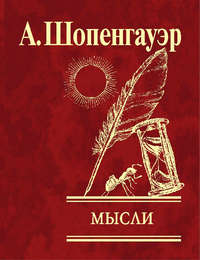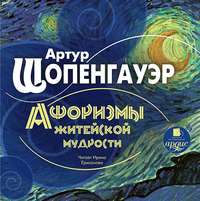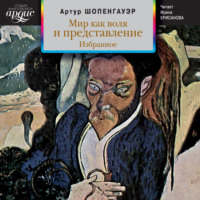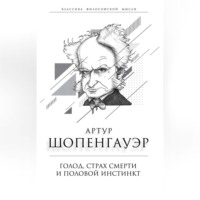 полная версия
полная версияThe World as Will and Idea (Vol. 2 of 3)
In order to prevent all misunderstandings about this important point, especially such as proceed from physiology pursued in a purely empirical manner, I shall explain the whole process somewhat more thoroughly. My doctrine asserts that the whole body is the will itself, exhibiting itself in the perception of the brain; consequently, having entered into its forms of knowledge. From this it follows that the will is everywhere equally present in the whole body, as is also demonstrably the case, for the organic functions are its work no less than the animal. But how, then, can we reconcile it with this, that the voluntary actions, those most undeniable expressions of the will, clearly originate in the brain, and thus only through the spinal cord reach the nerve fibres, which finally set the limbs in motion, and the paralysis or severing of which therefore prevents the possibility of voluntary movement? This would lead one to think that the will, like the intellect, has its seat only in the brain, and, like it, is a mere function of the brain.
Yet this is not the case: but the whole body is and remains the exhibition of the will in perception, thus the will itself objectively perceived by means of the functions of the brain. That process, however, in the case of the acts of will, depends upon the fact that the will, which, according to my doctrine, expresses itself in every phenomenon of nature, even in vegetable and inorganic phenomena, appears in the bodies of men and animals as a conscious will. A consciousness, however, is essentially a unity, and therefore always requires a central point of unity. The necessity of consciousness is, as I have often explained, occasioned by the fact that in consequence of the increased complication, and thereby more multifarious wants, of an organism, the acts of its will must be guided by motives, no longer, as in the lower grades, by mere stimuli. For this purpose it had at this stage to appear provided with a knowing consciousness, thus with an intellect, as the medium and place of the motives. This intellect, if itself objectively perceived, exhibits itself as the brain, together with its appendages, spinal cord, and nerves. It is the brain now in which, on the occasion of external impressions, the ideas arise which become motives for the will. But in the rational intellect they undergo besides this a still further working up, through reflection and deliberation. Thus such an intellect must first of all unite in one point all impressions, together with the working up of them by its functions, whether to mere perception or to conceptions, a point which will be, as it were, the focus of all its rays, in order that that unity of consciousness may arise which is the the theoretical ego, the supporter of the whole consciousness, in which it presents itself as identical with the willing ego, whose mere function of knowledge it is. That point of unity of consciousness, or the theoretical ego, is just Kant's synthetic unity of apperception, upon which all ideas string themselves as on a string of pearls, and on account of which the “I think,” as the thread of the string of pearls, “must be capable of accompanying all our ideas.”36 This assembling-place of the motives, then, where their entrance into the single focus of consciousness takes place, is the brain. Here, in the non-rational consciousness, they are merely perceived; in the rational consciousness they are elucidated by conceptions, thus are first thought in the abstract and compared; upon which the will chooses, in accordance with its individual and immutable character, and so the purpose results which now, by means of the cerebellum, the spinal cord, and the nerves, sets the outward limbs in motion. For although the will is quite directly present in these, inasmuch as they are merely its manifestation, yet when it has to move according to motives, or indeed according to reflection, it requires such an apparatus for the apprehension and working up of ideas into such motives, in conformity with which its acts here appear as resolves: just as the nourishment of the blood with chyle requires a stomach and intestines, in which this is prepared, and then as such is poured into the blood through the ductus thoracicus, which here plays the part which the spinal cord plays in the former case. The matter may be most simply and generally comprehended thus: the will is immediately present as irritability in all the muscular fibres of the whole body, as a continual striving after activity in general. Now if this striving is to realise itself, thus to manifest itself as movement, this movement must as such have some direction; but this direction must be determined by something, i. e., it requires a guide, and this is the nervous system. For to the mere irritability, as it lies in the muscular fibres and in itself is pure will, all directions are alike; thus it determines itself in no direction, but behaves like a body which is equally drawn in all directions; it remains at rest. Since the activity of the nerves comes in as motive (in the case of reflex movements as a stimulus), the striving force, i. e., the irritability, receives a definite direction, and now produces the movements. Yet those external acts of will which require no motives, and thus also no working up of mere stimuli into ideas in the brain, from which motives arise, but which follow immediately upon stimuli, for the most part inward stimuli, are the reflex movements, starting only from the spinal cord, as, for example, spasms and cramp, in which the will acts without the brain taking part. In an analogous manner the will carries on the organic life, also by nerve stimulus, which does not proceed from the brain. Thus the will appears in every muscle as irritability, and is consequently of itself in a position to contract them, yet only in general; in order that some definite contraction should take place at a given moment, there is required here, as everywhere, a cause, which in this case must be a stimulus. This is everywhere given by the nerve which goes into the muscle. If this nerve is in connection with the brain, then the contraction is a conscious act of will, i. e., takes place in accordance with motives, which, in consequence of external impressions, have arisen as ideas in the brain. If the nerve is not in connection with the brain, but with the sympathicus maximus, then the contraction is involuntary and unconscious, an act connected with the maintenance of the organic life, and the nerve stimulus which causes it is occasioned by inward impressions; for example, by the pressure upon the stomach of the food received, or of the chyme upon the intestines, or of the in-flowing blood upon the walls of the heart, in accordance with which the act is digestion, or motus peristalticus, or beating of the heart, &c.
But if now, in this process, we go one step further, we find that the muscles are the product of the blood, the result of its work of condensation, nay, to a certain extent they are merely solidified, or, as it were, clotted or crystallised blood; for they have taken up into themselves, almost unaltered, its fibrin (cruor) and its colouring matter (Burdach's Physiologie, Bd. v. § 686). But the force which forms the muscle out of the blood must not be assumed to be different from that which afterwards moves it as irritability, upon nerve stimulus, which the brain supplies; in which case it then presents itself in self-consciousness as that which we call will. The close connection between the blood and irritability is also shown by this, that where, on account of imperfection of the lesser circulation, part of the blood returns to the heart unoxidised, the irritability is also uncommonly weak, as in the batrachia. Moreover, the movement of the blood, like that of the muscle, is independent and original; it does not, like irritation, require the influence of the nerve, and is even independent of the heart, as is shown most clearly by the return of the blood through the veins to the heart; for here it is not propelled by a vis a tergo, as in the case of the arterial circulation; and all other mechanical explanations, such as a power of suction of the right ventricle of the heart, are quite inadequate. (See Burdach's Physiologie, Bd. 4, § 763, and Rösch, Ueber die Bedeutung des Blutes, § II, seq.) It is remarkable to see how the French, who recognise nothing but mechanical forces, controvert each other with insufficient grounds upon both sides; and Bichat ascribes the flowing back of the blood through the veins to the pressure of the walls of the capillary tubes, and Magendie, on the other hand, to the continue action of the impulse of the heart (Précis de Physiologie par Magendie, vol. ii. p. 389). That the movement of the blood is also independent of the nervous system, at least of the cerebral nervous system, is shown by the fetus, which (according to Müller's Physiologie), without brain and spinal cord, has yet circulation of the blood. And Flourens also says: “Le mouvement du cœur, pris en soi, et abstraction faite de tout ce qui n'est pas essentiellement lui, comme sa durée, son énergie, ne dépend ni immédiatement, ni coinstantanément, du système nerveux central, et conséquemment c'est dans tout autre point de ce système que dans les centres nerveux eux-mêmes, qu'il faut chercher le principe primitif et immédiat de ce mouvement” (Annales des sciences naturelles p. Audouin et Brougniard, 1828, vol. 13). Cuvier also says: “La circulation survit à la déstruction de tout l'encéphale et de toute la moëlle épiniaire (Mém. de l'acad. d. sc., 1823, vol. 6; Hist. d. l'acad. p. Cuvier,” p. cxxx). “Cor primum vivens et ultimum moriens,” says Haller. The beating of the heart ceases at last in death. The blood has made the vessels themselves; for it appears in the ovum earlier than they do; they are only its path, voluntarily taken, then beaten smooth, and finally gradually condensed and closed up; as Kaspar Wolff has already taught: “Theorie der Generation,” § 30-35. The motion of the heart also, which is inseparable from that of the blood, although occasioned by the necessity of sending blood into the lungs, is yet an original motion, for it is independent of the nervous system and of sensibility, as Burdach fully shows. “In the heart,” he says, “appears, with the maximum of irritability, a minimum of sensibility” (loc. cit., § 769). The heart belongs to the muscular system as well as to the blood or vascular system; from which, however, it is clear that the two are closely related, indeed constitute one whole. Since now the metaphysical substratum of the force which moves the muscle, thus of irritability, is the will, the will must also be the metaphysical substratum of the force which lies at the foundation of the movement and the formations of the blood, as that by which the muscles are produced. The course of the arteries also determines the form and size of all the limbs; consequently the whole form of the body is determined by the course of the blood. Thus in general the blood, as it nourishes all the parts of the body, has also, as the primary fluidity of the organism, produced and framed them out of itself. And the nourishment which confessedly constitutes the principal function of the blood is only the continuance of that original production of them. This truth will be found thoroughly and excellently explained in the work of Rösch referred to above: “Ueber die Bedeutung des Blutes,” 1839. He shows that the blood is that which first has life and is the source both of the existence and of the maintenance of all the parts; that all the organs have sprung from it through secretion, and together with them, for the management of their functions, the nervous system, which appears now as plastic, ordering and arranging the life of the particular parts within, now as cerebral, controlling the relation to the external world. “The blood,” he says, p. 25, “was flesh and nerve at once, and at the same moment at which the muscle freed itself from it the nerve, severed in like manner, remained opposed to the flesh.” Here it is a matter of course that the blood, before those solid parts have been secreted from it, has also a somewhat different character from afterwards; it is then, as Rösch defines it, the chaotic, animated, slimy, primitive fluid, as it were an organic emulsion, in which all subsequent parts are implicite contained: moreover, it has not the red colour quite at the beginning. This disposes of the objection which might be drawn from the fact that the brain and the spinal cord begin to form before the circulation of the blood is visible or the heart appears. In this reference also Schultz says (System der Circulation, § 297): “We do not believe that the view of Baūmgärten, according to which the nervous system is formed earlier than the blood, can consistently be carried out; for Baūmgärten reckons the appearance of the blood only from the formation of the corpuscles, while in the embryo and in the series of animals blood appears much earlier in the form of a pure plasma.” The blood of invertebrate animals never assumes the red colour; but we do not therefore, with Aristotle, deny that they have any. It is well worthy of note that, according to the account of Justinus Kerner (Geschichte zweier Somnambulen, § 78), a somnambulist of a very high degree of clairvoyance, says: “I am as deep in myself as ever a man can be led; the force of my mortal life seems to me to have its source in the blood, whereby, through the circulation in the veins, it communicates itself, by means of the nerves, to the whole body, and to the brain, which is the noblest part of the body, and above the blood itself.”
From all this it follows that the will objectifies itself most immediately in the blood as that which originally makes and forms the organism, perfects it by growth, and afterwards constantly maintains it, both by the regular renewal of all the parts and by the extraordinary restoration of any part that may have been injured. The first productions of the blood are its own vessels, and then the muscles, in the irritability of which the will makes itself known to self-consciousness; but with this also the heart, which is at once vessel and muscle, and therefore is the true centre and primum mobile of the whole life. But for the individual life and subsistence in the external world the will now requires two assistant systems: one to govern and order its inner and outer activity, and another for the constant renewal of the mass of the blood; thus a controller and a sustainer. It therefore makes for itself the nervous and the intestinal systems; thus the functiones animales and the functiones naturales associate themselves in a subsidiary manner with the functiones vitales, which are the most original and essential. In the nervous system, accordingly, the will only objectifies itself in an indirect and secondary way; for this system appears as a mere auxiliary organ, as a contrivance by means of which the will attains to a knowledge of those occasions, internal and external, upon which, in conformity with its aims, it must express itself; the internal occasions are received by the plastic nervous system, thus by the sympathetic nerve, this cerebrum abdominale, as mere stimuli, and the will thereupon reacts on the spot without the brain being conscious; the outward occasions are received by the brain, as motives, and the will reacts through conscious actions directed outwardly. Therefore the whole nervous system constitutes, as it were, the antennæ of the will, which it stretches towards within and without. The nerves of the brain and spinal cord separate at their roots into sensory and motory nerves. The sensory nerves receive the knowledge from without, which now accumulates in the thronging brain, and is there worked up into ideas, which arise primarily as motives. But the motory nerves bring back, like couriers, the result of the brain function to the muscle, upon which it acts as a stimulus, and the irritability of which is the immediate manifestation of the will. Presumably the plastic nerves also divide into sensory and motory, although on a subordinate scale. The part which the ganglia play in the organism we must think of as that of a diminutive brain, and thus the one throws light upon the other. The ganglia lie wherever the organic functions of the vegetative system require care. It is as if there the will was not able by its direct and simple action to carry out its aims, but required guidance, and consequently control; just as when in some business a man's own memory is not sufficient, and he must constantly take notes of what he does. For this end mere knots of nerves are sufficient for the interior of the organism, because everything goes on within its own compass. For the exterior, on the other hand, a very complicated contrivance of the same kind is required. This is the brain with its feelers, which it stretches into the outer world, the nerves of sense. But even in the organs which are in communication with this great nerve centre, in very simple cases the matter does not need to be brought before the highest authority, but a subordinate one is sufficient to determine what is needed; such is the spinal cord, in the reflex actions discovered by Marshall Hall, such as sneezing, yawning, vomiting, the second half of swallowing, &c. &c. The will itself is present in the whole organism, since this is merely its visible form; the nervous system exists everywhere merely for the purpose of making the direction of an action possible by a control of it, as it were to serve the will as a mirror, so that it may see what it does, just as we use a mirror to shave by. Hence small sensoria arise within us for special, and consequently simple, functions, the ganglia; but the chief sensorium, the brain, is the great and skilfully contrived apparatus for the complicated and multifarious functions which have to do with the ceaselessly and irregularly changing external world. Wherever in the organism the nerve threads run together in a ganglion, there, to a certain extent, an animal exists for itself and shut off, which by means of the ganglion has a kind of weak knowledge, the sphere of which is, however, limited to the part from which these nerves directly come. But what actuates these parts to such quasi knowledge is clearly the will; indeed we are utterly unable to conceive it otherwise. Upon this depends the vita propria of each part, and also in the case of insects, which, instead of a spinal cord, have a double string of nerves, with ganglia at regular intervals, the capacity of each part to continue alive for days after being severed from the head and the rest of the trunk; and finally also the actions which in the last instance do not receive their motives from the brain, i. e., instinct and natural mechanical skill. Marshall Hall, whose discovery of the reflex movements I have mentioned above, has given us in this the theory of involuntary movements. Some of these are normal or physiological; such are the closing of the places of ingress to and egress from the body, thus of the sphincteres vesicæ et ani (proceeding from the nerves of the spinal cord); the closing of the eyelids in sleep (from the fifth pair of nerves), of the larynx (from N. vagus) if food passes over it or carbonic acid tries to enter; also swallowing, from the pharynx, yawning and sneezing, respiration, entirely in sleep and partly when awake; and, lastly, the erection, ejaculation, as also conception, and many more. Some, again, are abnormal and pathological; such are stammering, hiccoughing, vomiting, also cramps and convulsions of every kind, especially in epilepsy, tetanus, in hydrophobia and otherwise; finally, the convulsive movements produced by galvanic or other stimuli, and which take place without feeling or consciousness in paralysed limbs, i. e., in limbs which are out of connection with the brain, also the convulsions of beheaded animals, and, lastly, all movements and actions of children born without brains. All cramps are a rebellion of the nerves of the limbs against the sovereignty of the brain; the normal reflex movements, on the other hand, are the legitimate autocracy of the subordinate officials. These movements are thus all involuntary, because they do not proceed from the brain, and therefore do not take place in accordance with motives, but follow upon mere stimuli. The stimuli which occasion them extend only to the spinal cord or the medulla oblongata, and from there the reaction directly takes place which effects the movement. The spinal cord has the same relation to these involuntary movements as the brain has to motive and action, and what the sentient and voluntary nerve is for the latter the incident and motor nerve is for the former. That yet, in the one as in the other, that which really moves is the will is brought all the more clearly to light because the involuntarily moved muscles are for the most part the same which, under other circumstances, are moved from the brain in the voluntary actions, in which their primum mobile is intimately known to us through self-consciousness as the will. Marshall Hall's excellent book “On the Diseases of the Nervous System” is peculiarly fitted to bring out clearly the difference between volition and will, and to confirm the truth of my fundamental doctrine.
For the sake of illustrating all that has been said, let us now call to mind that case of the origination of an organism which is most accessible to our observation. Who makes the chicken in the egg? Some power and skill coming from without, and penetrating through the shell? Oh no! The chicken makes itself, and the force which carries out and perfects this work, which is complicated, well calculated, and designed beyond all expression, breaks through the shell as soon as it is ready, and now performs the outward actions of the chicken, under the name of will. It cannot do both at once; previously occupied with the perfecting of the organism, it had no care for without. But after it has completed the former, the latter appears, under the guidance of the brain and its feelers, the senses, as a tool prepared beforehand for this end, the service of which only begins when it grows up in self-consciousness as intellect, which is the lantern to the steps of the will, its ἡγεμονικον, and also the supporter of the objective external world, however limited the horizon of this may be in the consciousness of a hen. But what the hen is now able to do in the external world, through the medium of this organ, is, as accomplished by means of something secondary, infinitely less important than what it did in its original form, for it made itself.
We became acquainted above with the cerebral nervous system as an assistant organ of the will, in which it therefore objectifies itself in a secondary manner. As thus the cerebral system, although not directly coming within the sphere of the life-functions of the organism, but only governing its relations to the outer world, has yet the organism as its basis, and is nourished by it in return for its services; and as thus the cerebral or animal life is to be regarded as the production of the organic life, the brain and its function, knowledge, thus the intellect, belong indirectly and in a subordinate manner to the manifestation of the will. The will objectifies itself also in it, as will to apprehend the external world, thus as will to know. Therefore great and fundamental as is the difference in us between willing and knowing, the ultimate substratum of both is yet the same, the will, as the real inner nature of the whole phenomenon. But knowing, the intellect, which presents itself in self-consciousness entirely as secondary, is to be regarded not only as the accident of the will, but also as its work, and thus, although in a circuitous manner, is yet to be referred to it. As the intellect presents itself physiologically as the function of an organ of the body, metaphysically it is to be regarded as a work of the will, whose objectification or visible appearance is the whole body. Thus the will to know, objectively perceived, is the brain; as the will to go, objectively perceived, is the foot; the will to grasp, the hand; the will to digest, the stomach; the will to beget, the genitals, &c. This whole objectification certainly ultimately exists only for the brain, as its perception: in this the will exhibits itself as organised body. But so far as the brain knows, it is itself not known, but is the knower, the subject of all knowledge. So far, however, as in objective perception, i. e., in the consciousness of other things, thus secondarily, it is known, it belongs, as an organ of the body, to the objectification of the will. For the whole process is the self-knowledge of the will; it starts from this and returns to it, and constitutes what Kant has called the phenomenon in opposition to the thing in itself. Therefore that which is known, that which is idea, is the will; and this idea is what we call body, which, as extended in space and moving in time, exists only by means of the functions of the brain, thus only in it. That, on the other hand, which knows, which has that idea, is the brain, which yet does not know itself, but only becomes conscious of itself subjectively as intellect, i. e., as the knower. That which when regarded from within is the faculty of knowledge is when regarded from without the brain. This brain is a part of that body, just because it itself belongs to the objectification of the will, the will's will to know is objectified in it, its tendency towards the external world. Accordingly the brain, and therefore the intellect, is certainly conditioned immediately by the body, and this again by the brain, yet only indirectly, as spatial and corporeal, in the world of perception, not in itself, i. e., as will. Thus the whole is ultimately the will, which itself becomes idea, and is that unity which we express by I. The brain itself, so far as it is perceived– thus in the consciousness of other things, and hence secondarily – is only idea. But in itself, and so far as it perceives, it is the will, because this is the real substratum of the whole phenomenon; its will to know objectifies itself as brain and its functions. We may take the voltaic pile as an illustration, certainly imperfect, but yet to some extent throwing light upon the nature of the human phenomenon, as we here regard it. The metals, together with the fluid, are the body; the chemical action, as the basis of the whole effect, is the will, and the electric current resulting from it, which produces shock and spark, is the intellect. But omne simile claudicat.









